Chapter 7 Bankruptcy Forms

Forms Needed for Chapter 7 in Kentucky
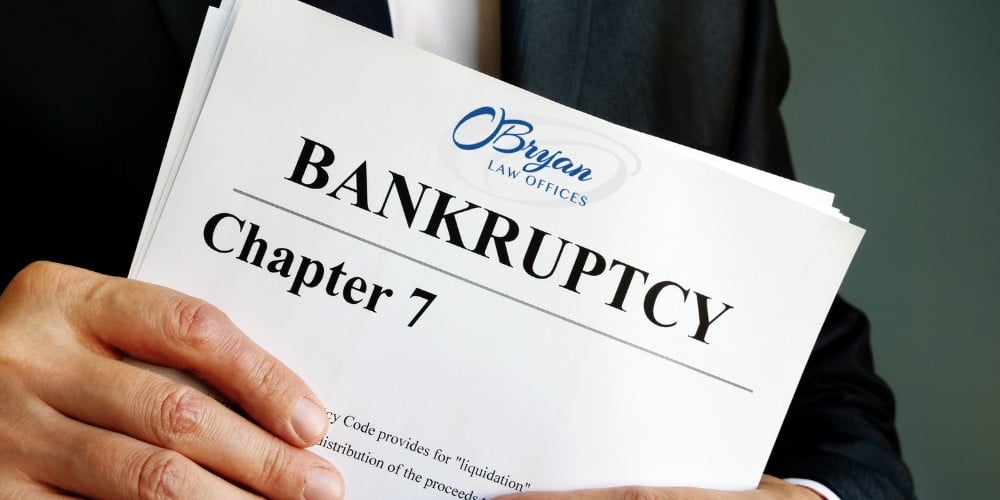
When you decide to file bankruptcy, you’ll need to gather and fill out a lot of paperwork. Having an experienced Kentucky bankruptcy lawyer on your side can help greatly. You can find just about every form you’ll need online, but how are you supposed to know which ones to print and fill out? Our attorneys are here to help you figure out which Chapter 7 bankruptcy forms you’ll need, when you’ll need them, and what you’ll need to do with them.
At O’Bryan Law Offices, we have decades of experience handling different bankruptcy case types in both Kentucky and Southern Indiana. An experienced bankruptcy attorney with our firm will counsel you on how to begin your bankruptcy case, walk you through the process, and give you advice on how to get your finances back on track. We don’t just get your case through the local bankruptcy court and then leave you on your own. We counsel our clients on financial literacy, good credit habits, and how to maintain your debt relief.
If you’re struggling under the weight of crushing debt, Chapter 7 bankruptcy is a valid solution. To find out more about how we can help with your bankruptcy petition, schedule a free, no-obligation consultation with us. Call our office at 502-339-0222 or fill out our online intake form today.
Starting Chapter 7 Bankruptcy
In order to begin your Chapter 7 bankruptcy case, you’ll need to file a bankruptcy petition with your local bankruptcy court. You’ll also need to determine which bankruptcy court has jurisdiction over your case. In addition, you will submit official bankruptcy forms that outline the following.
- Full list of your assets and liabilities
- Outline of your current income and expenses
- Statement of your current financial affairs
- Lists of your current leases and contracts
You’ll also need to submit certain documents to your bankruptcy trustee. In the following sections, we’ll go over all the bankruptcy forms and financial documents you’ll need throughout your case. An experienced bankruptcy lawyer with our firm will be with you every step of the way to ensure that you never feel lost or confused.
How to Keep Your Documents Organized in Bankruptcy
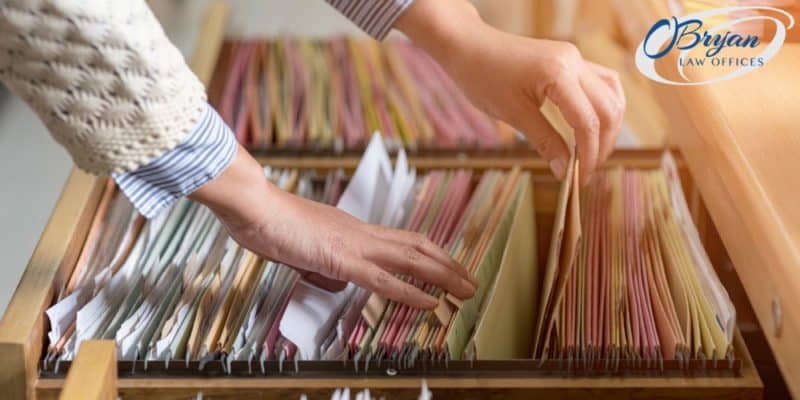
Organization is incredibly important when it comes time to file bankruptcy. It can be deceptively confusing to handle a bankruptcy case on your own, especially if you’ve never been exposed to it before. Filing to submit even one bankruptcy form could result in your personal bankruptcy case being dismissed. This can be a costly mistake to make, so working closely with a bankruptcy attorney can help.
The most important thing to remember is that the bankruptcy court and judge will accept nothing short of total transparency on your end. You will disclose everything, including your debts, assets, income, bank statements, and much more. It’s also a good idea to gather proof of everything you submit in your bankruptcy petition.
What Are the Documents Needed to File Chapter 7?
When you work with a seasoned Chapter 7 bankruptcy attorney, we’ll ensure that individuals filing for bankruptcy have a checklist of everything they need to complete their case. Many people assume that bankruptcy cases will be easy, but this is often not the case. Working with an attorney can help you avoid costly mistakes when filling out and submitting your bankruptcy forms. In the following sections, we outline the forms and other documents that individuals filing bankruptcy will need.
Chapter 7 Documents Needed Before Filing
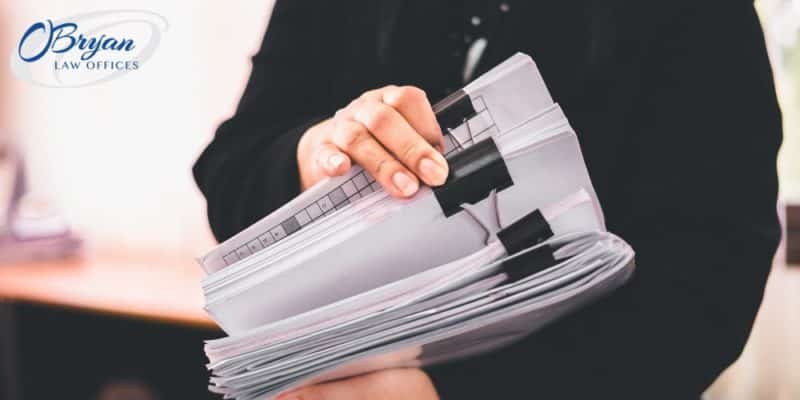
Before you submit any documents or pay a filing fee for your bankruptcy case, we recommend gathering the following documents and records.
Legal Documents
When someone starts a bankruptcy case, the court will want to know about their legal history, as well as any pending or ongoing litigation that involves them. We recommend giving all of this information to your attorney. This information is vital, as it can affect whether or not you can afford to pay your creditors, as well as which bankruptcy chapter is right for you. Examples of important legal documents include the following.
- Eviction judgment papers
- Divorce decrees that require you to pay child support or alimony
- Any relevant legal files from previous lawyers
- Other judgments against you
Financial Records
Your financial records are among the most important documents you’ll need for your case. They will help determine which chapter to file between Chapter 7 and Chapter 13. Examples of these financial documents include the following.
- Evidence of your current monthly income, such as pay stubs
- Your most recent bank statements
- Tax returns
- Recent bills from your creditors
- Payment receipts for a car loan, home loan, or student loans
- Invoices or bills from purchases in the past year
Other Documents
The rest of the documents you’ll need for your case involve your assets, as well as income verification. It is crucial to include all of your assets, as they help to determine whether or not you can afford to repay your creditors. Examples of other documents that you may need for your case include the following.
- All correspondences between you and your creditors, especially negative ones
- All of your current insurance policies
- Canceled checks if you lack proof of an expense
- Your tax returns from the past few years
- Leases or mortgages
- Lawsuits that you have been served
- Valid proof that someone owes you money
- Promissory notes that you’ve signed
- Vehicle titles
- Documents that show debts you owe other people
- Appraisals, if any
- Any life insurance policies
Chapter 7 Documents Needed During Filing
The average Chapter 7 case will require a lot of documents. This is necessary because the bankruptcy court needs a full picture of the filer’s financial situation. Be sure to include everything, as even accidentally leaving something out could result in the dismissal of your case. During your case, the court will likely need you to provide the following documents in a timely manner.
- Full list of your creditors
- Full list of your assets and liabilities
- Chapter 7 bankruptcy petition
- Current expenses and income
- Pay stubs for a certain period of time before filing
- Your monthly net income
- Documents that show an increase in your expenses or income
- You may also need to produce the following miscellaneous documents for the court.
- Last year’s tax return
- Lists of real and personal property
- State ID card, driver’s license, and social security card
- Certificate of credit counseling course completion
- Paychecks from the past several months
- Paperwork that shows your secured and unsecured debts
Chapter 7 Documents Needed After Filing
Once you submit your voluntary petition to the court, you’ll still need to submit other bankruptcy forms. Before the 341 meeting, we recommend gathering the following documents.
- Pay stubs from the past 60 days
- Your most recent tax return
- Bank statements from the past 60 days
- Certification of completion for a debt’s education courts
Before the 341 meeting happens, you’ll send the above documents to your bankruptcy trustee. The sooner you send them, the better, as the bankruptcy trustee will need these documents to oversee your case.
Kentucky Chapter 7 Bankruptcy Forms
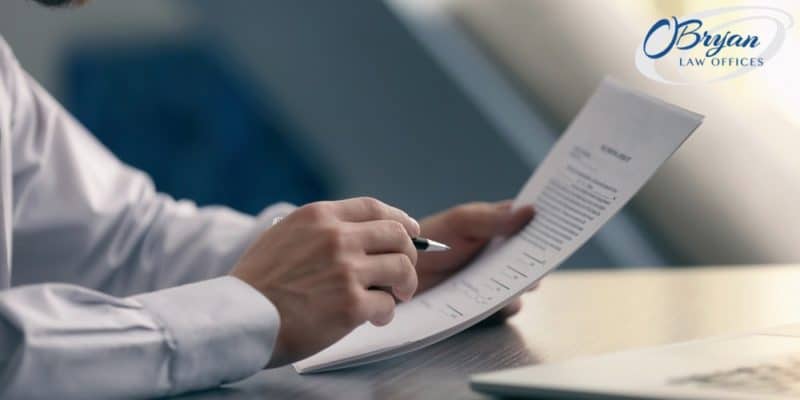
State and local rules can vary when it comes to an individual debtor’s schedules and necessary documents. The easiest way to determine what you’ll need is to speak with an experienced bankruptcy lawyer in Kentucky. We already know about all the state and local forms you’ll need, so you can rest assured that you won’t forget anything important. In Kentucky, you’ll likely need to file the following bankruptcy documents.
- Voluntary Bankruptcy Petition – information about who you are
- Schedule A/B – full list of your property
- Schedule C – list of your bankruptcy exemptions
- Schedule D – secured debts
- Schedule E/F – priority debts
- Schedule G – continuing leases and contracts
- Schedule H – full list of debts
- Schedule I – current monthly income
- Schedule J – current monthly expenses
- Declaration About Schedules – statement that all of the information in your forms is accurate to the best of your knowledge
- Summary of Assets and Liabilities – summary of your debts, income, and assets
- Statement of Intention – statement to the court of what you want to do with your collateral for secured debts
- Statement of Financial Affairs – a list of questions about your finances that don’t fit with other documents
- Statement of Current Monthly Income – you (and your spouse’s) average income for the past 6 months
- Statement About Social Security Numbers – simply list your Social Security Number (SSN) or your Individual Taxpayer Identification Number (ITIN)
- Creditor Matrix – mailing list for all your creditors to notify them of your bankruptcy case
- Verification of Creditor Matrix – statement that the creditor matrix is accurate
- Credit Counseling Course Certificate – certificate that verifies you have completed an approved credit counseling courts
Keep in mind that you may need other forms and documents in order to complete your case. For example, the Eastern District of Kentucky requires you to also submit your Employee Income Records. Speak with your attorney to ensure that you prepare and file all the necessary documents for your case.
Does Chapter 7 Wipe Out All Debt?
Not automatically. However, it will wipe out most of your debts. You can also apply for a fee waiver in order to avoid paying filing fees. In general, Chapter 7 bankruptcy will not discharge the following debts.
- Child support and alimony
- Debts that you didn’t list at the start of your case
- Student loans, unless paying them would cause you undue hardship
- Taxes
- Court fees
- Penalties, restitution, or fines imposed by the government
- Fraud debts
- Damages that you owe for personal injury cases
- Debts that were non-dischargeable in a previous bankruptcy
Speak with your attorney to ensure that you fully understand which of your debts will not be erased when you file for bankruptcy.
Is Filing Chapter 7 Worth It?
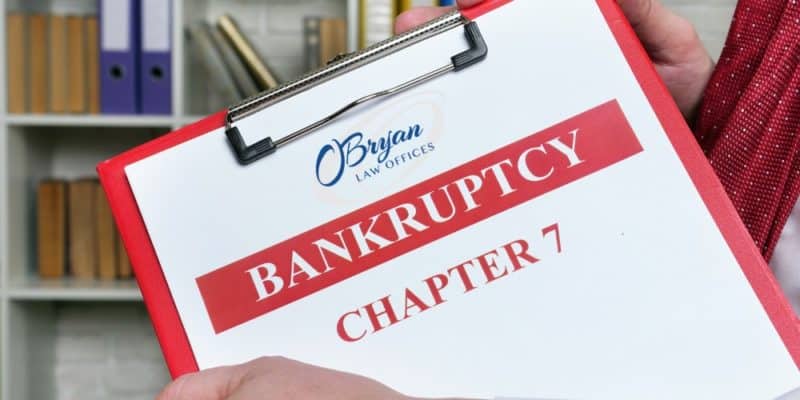
If you’re struggling under crushing debt, Chapter 7 bankruptcy can help you achieve debt relief in less than a year. Most of your unsecured debts are discharged, and you can put an end to creditor harassment. Bankruptcy is a reliable way to eliminate your debts while also giving you legal protections for the duration of your case. If you’re looking for a fresh start, Chapter 7 could be the answer you need.
Contact a Chapter 7 Lawyer in Kentucky Today
If you’re considering filing Chapter 7 bankruptcy in Kentucky or Southern Indiana, the O’Bryan Law Offices are here for you. We understand that handling the entire process on your own can be a daunting task. That’s why we help bankruptcy filers with their cases. We also help them prepare before filing, as well as handle what comes after bankruptcy. This includes completing a credit counseling course, getting car loans or home loans after bankruptcy, and much more. To schedule your free consultation with us, please call our Louisville office at 502-339-0222 today.
